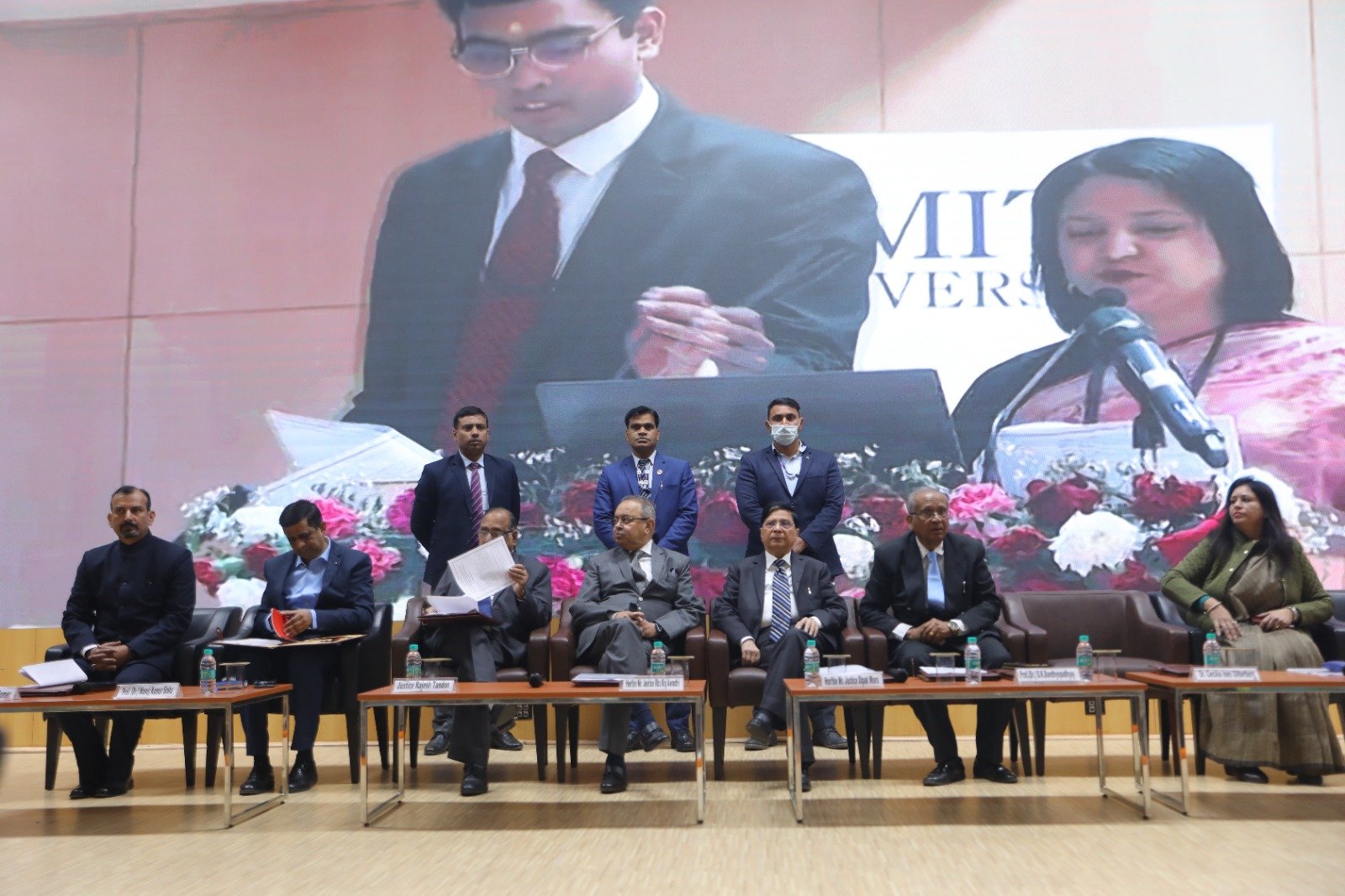- World Wide
- International
- National
- State
- Union Territory
- Capital
- Social
- Political
- Legal
- Finance
- Education
- Medical
- Science & Tech.
- Information & Tech.
- Agriculture
- Industry
- Corporate
- Business
- Career
- Govt. Policy & Programme
- Health
- Sports
- Festival & Astrology
- Crime
- Men
- Women
- Outfit
- Jewellery
- Cosmetics
- Make-Up
- Romance
- Arts & Culture
- Glamour
- Film
- Fashion
- Review
- Satire
- Award
- Recipe
- Food Court
- Wild Life
- Advice

21st century was emphasized leading to the collective development of norms through interdisciplinary collaboration-Justice Dipak Misra, Chief Justice of India(Retd)
Amity Law School, Noida organized an International
Conference on Comparative Law on 09th and 10th February 2024
in collaboration with School of Business and Law, Edith Cowan University,
Western Australia in hybrid mode. The programme commenced with an Inaugural
Ceremony on 09th Feb 2024 beginning with the lightening of the lamp.
The guests were welcomed with a Tulsi sapling as a tradition of Amity
University.
Prof. (Dr.) Aditya Tomer, Conference
Chairperson and Additional Director, Amity Law School Noida and gave the
Welcome Address and welcomed all the dignitaries for their physical and virtual
presence. He was happy to inform that the organizing committee got an
overwhelming response for paper presentation. He said that this conference will
give a chance to all the students to exchange knowledge amongst each other. He
stressed the importance of dialogue on Comparative Law.
Prof. (Dr) Balvinder Shukla, Vice -Chancellor, Amity University Uttar
Pradesh thanked the Edith Cowan University, Western Australia for the
continuous collaboration with Amity University for five years. She extended a
warm welcome to all the Guests of Honour. She stated how Comparative Law is
important to understand the different laws of different countries as business
happens across the borders. She emphasised the vision of Chancellor, Amity
University that he believes that all students of Amity should excel in their
field and be the successful leaders while making world a better place to live.
She closed her address by once again thanking the dignitaries and
congratulating the organising committee.
Prof. Justice Rajesh Tandon, Additional Vice Chairman, AJA &
ALF, Amity Law School, Noida began
his address by thanking everyone for organizing the international conference.
He stated how Amity University is a leading research university. He also stated
the initiatives of Hon’ble Founder President’s, Amity Education Group for starting
judiciary exam preparations. He emphasised how comparative law builds a
foundation through which development takes place across the globe. He related the
evolution of Human Rights and Comparative Law with certain landmark events such
as Magna Carta, adoption of International Covenant on Civil and Political
Rights, Declaration of Human Rights.
Dr Joshua N Aston, Associate Dean & Conference
Co-Chair, School of Business and Law, Edith Cowan University, Western Australia
who joined the session virtually. He emphasised on how this international conference acts as a bridge
between the two Universities. He extended his warm wishes to the organising committee
and shared his inability for his physical presence this year. He concluded his
address by thanking Hob’ble Founder President Sir and Hon’ble Chancellor Sir,
and Hon’ble Vice Chancellor, Amity University for the continued collaboration
and gave his Best Wishes for the two-day conference.
Prof. (Dr) D. K. Bandyopadhyay, Conference Director, Chairman,
Amity Law Schools & Chief Advisor, Founder President’s Office began his speech by emphasising the
significance of comparative law in every field of Research and Law. He outlined
the purpose of the conference as a platform for exchanging ideas and
celebrating the development of legal perspectives. He encouraged the
participants to utilize the conference for personal and academic growth. He
enlightened the audience regarding the vision of Founder President to be a leader and not a
follower at the end he thanked the guests and stressed the relevance of
comparative law in the face of technological advancements. He urged students to
seize the opportunity to understand the dimensions of different laws and adapt
to future changes in India's legal landscape.
Hon’ble Mr. Justice Dipak Misra, Chief Justice of
India (Retd) began his speech by
engaging with students on the topic of comparative law, particularly focusing
on Comparative Constitutional Law. He highlighted its emergence due to
historical developments driven by globalization and a sense of belongingness.
The importance of universal connectivity in the 21st century was emphasized,
leading to the collective development of norms through interdisciplinary
collaboration. He traced the origins of comparative law to ancient
philosophies, with a focus on the doctrine of inclusiveness. He elaborated upon
the concept of Rule of Law stating its multiple definitions and interpretations
across jurisdictions. He emphasised upon Right to Information (RTI) and the
balancing between private and public interests.
Hon’ble Mr. Justice John Alexander Logan, Judge, Federal Court of Australia
joined the session virtually from Australia. He provided insights into International
Comparative Law focusing on terms of a contract and performance of a contract.
He elaborated this by giving various judicial interpretations on the meaning of
‘reasonable time’ in performance of a contracts under comparative law. He spoke
about differences in Civil and Common Law jurisdictions. Expressing gratitude
for the invitation, the speaker highlighted India's emerging leadership role
and discussed the collaboration and separation of powers between continents,
emphasizing fairness.
Dr Cecilia Inés Silberberg, Embassy Counsellor and
Consul Argentina Embassy started
her address by putting up a question on what exactly the role of comparative
law in international law is. She further stated that the important aspect of
comparative law is that it provides a legal framework which might not be
perfect to work with, but that framework would be enough, and it should also provide
objectives for the same. According to her, there must be an analysis of the
regulation but at the same time a certain bias might be there. She went to give
an example of a research she conducted during the first year of the COVID-19
pandemic for data protection and protection of rights. The speaker concluded
her speech by saying comparative law is of utmost importance and can’t do
anything without taking care of already established laws. She finally concluded
her speech by saying that it’s important to save lives and protected human
dignity.
Prof. (Dr) Manoj Kumar Sinha, Vice-Chancellor, Dharmashastra
National Law University, Jabalpur started with the importance of including
comparative law in the curriculum. According to him, law and justice in the
globalizing world are essential for comparing legal frameworks. He suggested
that the governments should start examining if state sovereignty has stayed
sacrosanct or not. It has been pursued it vigorously and should be taken
seriously.
Hon’ble Mr. Justice Ritu Raj Awasthi, Chairperson, Law Commission of India started
his address by acknowledging the presence of all the esteemed guests on the dais.
He emphasized the importance of learning, promoting a more robust and globally
informed approach to understand the constitution. He further stated that it is
essential to compare different constitutions of different countries according
to which legal theories are developed around the world and the same ideas are
applied to the native constitution of the country. He elaborated that legal
systems are rooted in the native culture and blindly applying foreign cases can
lead to inconsistencies within the interpretation and enforcement of
constitution .
Inaugural Ceremony concluded with book release by the
dignitaries.
Prof. (Dr.) Shefali Raizada, Additional Director /Jt. HOI, Amity Law
School, Noida proposed the Vote of Thanks.


























रिपोर्टर
The Reporter specializes in covering a news beat, produces daily news for Aaple Rajya News
Aishwarya Sinha